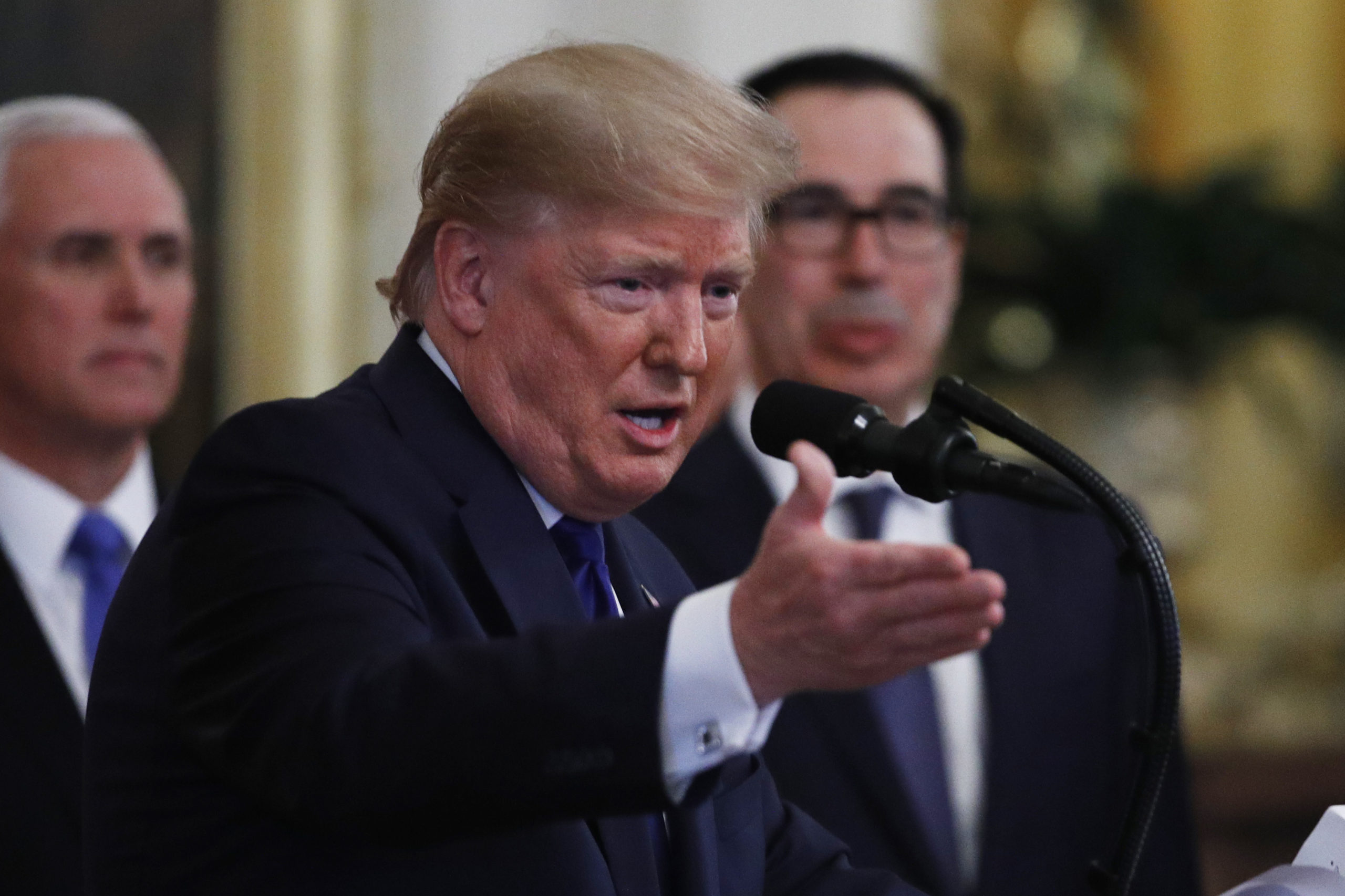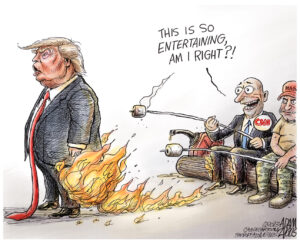Trump’s Unprecedented Attack on Iran and the Rule of Law
There exists no legal framework for the assassination of Qassem Soleimani. Congress must reassert its war powers or risk further attempts. President Donald Trump prepares to sign a U.S.-China trade agreement at the White House Wednesday. (Steve Helber / AP)
President Donald Trump prepares to sign a U.S.-China trade agreement at the White House Wednesday. (Steve Helber / AP)
The assassination of Iranian major general Qassem Soleimani on Jan. 3 in Baghdad is what happens when the steady erosion of congressional war-making powers intersects with the tenancy of a madman in the Oval Office.
I know. Soleimani was, to invoke the parlance of another grossly unqualified commander in chief (and a sitting Democratic senator in Connecticut), “an evildoer,” with decades of blood on his hands. I have no sympathy for him. This column isn’t about Soleimani or the repressive medieval theocrats that govern Iran. It’s about us and our respect for the rule of law.
No matter how vile Soleimani was, his crimes cannot justify his murder, as The Intercept’s James Risen termed the targeted killing in a recent essay. Summary executions, even of the most heinous individuals, remain illegal.
Worse still, the drone strike on Soleimani could be just the first of many such undertakings by the Trump administration, signaling a new phase in American drone warfare aimed not only at nonstate terrorists, but also at hostile foreign state officials. On the same night Soleimani was slain, U.S. forces launched a similar attack in Yemen on another Iranian military commander, Abdul Reza Shahlai. Unlike Soleimani, Shahlai survived.
To date, Trump’s publicly announced justifications for Soleimani’s assassination have shifted wildly, in the fashion of dictators of developing nations, lurching from one bogus rationale to another.
“Soleimani was plotting imminent and sinister attacks on American diplomats and military personnel but we caught him in the act and terminated him,” Trump told reporters on the morning of the attack in a statement delivered at his Mar-a-Lago resort in Florida. “We took action last night to stop a war. We did not take action to start a war.”
During an interview with Fox News’ Laura Ingraham on Jan. 8, the president went further, claiming that Soleimani had been planning “imminent” attacks on “four U.S. embassies,” which, apart from the installation in Baghdad, he notably didn’t name. He made the same claim the following day at a rally in Toledo, Ohio.
More recently, in a Jan. 13 tweet, Trump insisted again Soleimani was planning imminent strikes, but this time he added a new and very disturbing assertion—that “it doesn’t really matter” if the attacks were “imminent” because of Soleimani’s “horrible past!”
Senior administration officials have struggled clumsily to keep up with their boss’ kaleidoscopic fabrications. At a White House press conference on Jan. 10, Secretary of State Mike Pompeo reasserted the imminence justification, remarking, “We had specific information on an imminent threat and those included attacks on U.S. embassies. Period, full stop.” Urged to define “imminent,” however, Pompeo demurred, saying only, “This was gonna happen and American lives were at risk and we would’ve been culpably negligent … had we not recommended [to] the president that he take this action.”
The stumbles continued during the Sunday morning television news shows that aired Jan. 12. Desperately trying to reconcile Trump’s contentions with reality, Defense Secretary Mark Esper told CNN’s Jake Tapper:
The President never said there was specific intelligence to four different embassies. What the President said with regard to the four embassies is what I believe as well. He said that he believed that they probably, that they could have been targeting the embassies in the region.
Nonetheless, “imminence” was the formal justification Pompeo, Esper, CIA director Gina Haspel and Gen. Mark Milley, the chair of the Joint Chiefs of Staff, reportedly offered in a classified briefing with members of Congress on Jan. 8.
The briefing, according to several accounts, was an unmitigated disaster. “We did not get information inside that briefing that there was a specific, imminent threat,” Sen. Chris Murphy, D-Conn., said afterward.
Even some Republicans were outraged. The briefing was “probably the worst I’ve seen, at least on a military issue, in the nine years I’ve served in the U.S. Senate,” said Sen. Mike Lee, R-Utah.
It’s easy to understand Lee’s consternation. Neither U.S. nor international law support the killing of Soleimani or the attempt to take out Shahlai.
First and foremost, under the Constitution, only Congress has the power to declare war. No declaration of war with Iran has been issued. As Trump himself has conceded, the U.S. does not want an all-out war.
Sadly, the absence of a declaration of war isn’t likely to deter the Trump administration any more than other administrations have been deterred from waging undeclared armed conflicts. Congress last passed formal declarations of war on June 4, 1942, against Bulgaria, Hungary and Romania. (War was declared against Japan on Dec. 8, 1941 and on Dec. 11, 1941 against Germany and Italy.)
Since then, one administration after another has invoked the president’s inherent powers under Article II of the Constitution as commander in chief of the military in conflicts large and small, ranging from Korea and Vietnam to Afghanistan and Iraq. Such conflicts have been justified on the basis of “national self-defense,” sometimes pursuant to U.N. resolutions, as in Korea, or under the aegis of congressional decrees authorizing the use of force, as in Vietnam with the Gulf of Tonkin Resolution.
But there is no U.N. or congressional resolution that authorizes the killing of Soleimani. Both the Authorization for Use of Military Force (AUMF) passed by Congress in 2001 and the AUMF passed in 2002 are inapplicable.
The 2001 AUMF endorsed the use of force against the perpetrators of the 9/11 attacks, specifically al-Qaida. The Obama administration subsequently stretched the reach of the authorization to include other nonstate terror groups, such as the Islamic State group. Iran, by contrast, is a sovereign nation, and despite recent claims by Vice President Mike Pence, there is no evidence that Iran aided the 9/11 hijackers.
The 2002 AUMF is also irrelevant, as it authorized the use of force against Saddam Hussein’s Iraqi government. It provides no authorization for striking Iran or its leaders.
Neither can the Trump administration rely on general principles of self-defense for the killing of Soleimani. In its justification of drone strikes against U.S. citizens who had joined al-Qaida, even the Obama administration recognized that targeted individuals must pose “an imminent threat of violent attack against the United States.” The term “imminent” has a well-established meaning in American law on self-defense, connoting an immediate or present threat rather than a future possibility.
Absent proof of an imminent threat, the killing of Soleimani should be considered an assassination, which is illegal under a series of executive orders dating back to the administration of President Gerald Ford.
International law, although complex, also weighs against the strike on Soleimani. While Article 51 of the U.N. Charter recognizes the right of nations to engage in acts of self-defense, neither it nor other international agreements, such as the 1907 Hague and 1949 Geneva Conventions, permit the premeditated killing of specific individual commanders for past acts.
In compliance with its responsibilities as a U.N. member, the U.S. reported to the world body on Jan. 8 that it had “undertaken certain actions [including the Soleimani killing] in the exercise of its inherent right of self-defense” under Article 51. But as Rutgers University Law professor Adil Ahmad Haque noted in a Jan. 10 article published by the Just Security website, international law prohibits the use of armed force except upon “clear evidence of an ongoing or imminent attack.”
It is also unconvincing to justify Soleimani’s killing as an act of deterrence against future aggression, as both Attorney General William Barr and Secretary Pompeo claimed on Monday. Deterrence, as Professor Haque explains, “is not a legal defense. [It] is a confession.”
Perhaps nothing underscores the hypocrisy, illegality, danger and downright madness of the Trump administration’s everchanging positions than news reports earlier this week indicating that the president actually approved the hit on Soleimani last summer or fall.
On Jan. 10, the House took a tentative first step to rein in the president, passing a “concurrent resolution” to restrict Trump’s power to strike Iran again without congressional approval. However, even if the measure clears the Senate, it will lack the force of law, as concurrent resolutions are not binding on the executive branch. They are symbolic only.
A “joint resolution” designed to restrict further hostilities with Iran is pending in the Senate that would have the force of law if it is passed, but it will need a two-thirds vote from both houses of Congress to override an expected veto by Trump.
It’s up to the American people to stand up and demand that Congress—Democrats and Republicans—do just that, returning our war-making powers to the first branch of government, where they belong. It’s time to demand an end to the madness once and for all.
Your support is crucial…With an uncertain future and a new administration casting doubt on press freedoms, the danger is clear: The truth is at risk.
Now is the time to give. Your tax-deductible support allows us to dig deeper, delivering fearless investigative reporting and analysis that exposes what’s really happening — without compromise.
Stand with our courageous journalists. Donate today to protect a free press, uphold democracy and unearth untold stories.









You need to be a supporter to comment.
There are currently no responses to this article.
Be the first to respond.